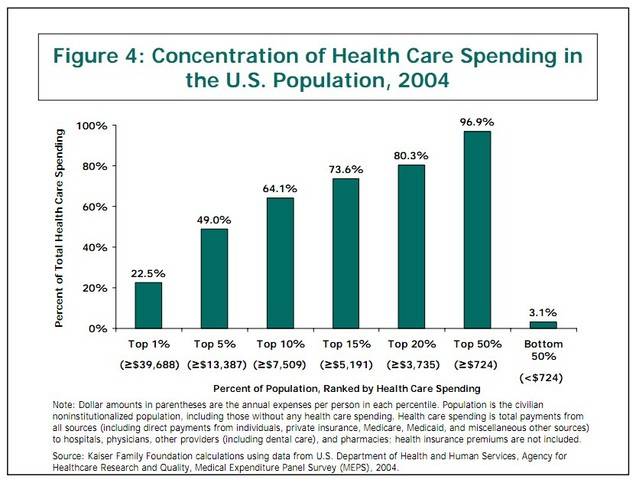Bfgrn
Gold Member
- Apr 4, 2009
- 16,829
- 2,492
- 245
WHY did health care need reform? Because Wall Street took complete control of the health care industry. Profit driven incentives create REAL death panels for Americans. Insurance corporations are incentivized to deny patient coverage and push more and more of the costs onto consumers.
For anyone who wants an insider's knowledge of this, I recommend investing a half hour of your time to listen to what this man has to say...
Wendell Potter is former Vice President of corporate communications at CIGNA, one of the United States' largest health insurance companies. In June 2009, he testified against the HMO industry in the U.S. Senate.
Looking back over his long career, Potter sees an industry corrupted by Wall Street expectations and greed. According to Potter, insurers have every incentive to deny coverage every dollar they don't pay out to a claim is a dollar they can add to their profits, and Wall Street investors demand they pay out less every year. Under these conditions, Potter says, "You don't think about individual people. You think about the numbers, and whether or not you're going to meet Wall Street's expectations."
Profits before Patients - Wendell Potter

WATCH VIDEO
READ TRANSCRIPT

Following a 20-year career as a corporate public relations executive, Wendell left his position as head of communications for CIGNA, one of the nations largest health insurers, to help socially responsible organizations including those advocating for meaningful health care reform achieve their goals.
In widely covered testimony before the Senate Commerce, Science and Technology Committee in June of 2009, Wendell disclosed how insurance companies, as part of their efforts to boost profits, have engaged in practices that have resulted in millions of Americans being forced into the ranks of the uninsured. Wendell also described how the insurance industry has developed and implemented strategic communications plans, based on deceptive public relations, advertising and lobbying efforts, to defeat reform initiatives.
Since then Wendell has testified before two House committees, briefed several members of Congress and their staffs, appeared with members of Congress at several press conferences, spoken at more than 100 public forums, and has been the subject of numerous articles in the U.S. and foreign media.
At CIGNA, Wendell served in a variety of positions over 15 years, most recently as head of corporate communications and chief corporate spokesperson. Prior to joining CIGNA, Wendell headed communications at Humana Inc., another large for-profit health insurer. Before that he was director of public relations and advertising for the Baptist Health System of East Tennessee and a partner in an Atlanta public relations firm. He also serves as a consumer liaison representative for the National Association of Insurance Commissioners.
Wendell Potter's News Articles
As one former insurance executive testified before Congress, insurance companies are not only encouraged to find reasons to drop the seriously ill; they are rewarded for it. All of this is in service of meeting what this former executive called, Wall Streets relentless profit expectations. President Barack Obama, Remarks to Joint Session of Congress, September 9, 2009
It is the job of thinking people not to be on the side of the executioners.
Albert Camus
For anyone who wants an insider's knowledge of this, I recommend investing a half hour of your time to listen to what this man has to say...
Wendell Potter is former Vice President of corporate communications at CIGNA, one of the United States' largest health insurance companies. In June 2009, he testified against the HMO industry in the U.S. Senate.
Looking back over his long career, Potter sees an industry corrupted by Wall Street expectations and greed. According to Potter, insurers have every incentive to deny coverage every dollar they don't pay out to a claim is a dollar they can add to their profits, and Wall Street investors demand they pay out less every year. Under these conditions, Potter says, "You don't think about individual people. You think about the numbers, and whether or not you're going to meet Wall Street's expectations."
Profits before Patients - Wendell Potter

WATCH VIDEO
READ TRANSCRIPT

Following a 20-year career as a corporate public relations executive, Wendell left his position as head of communications for CIGNA, one of the nations largest health insurers, to help socially responsible organizations including those advocating for meaningful health care reform achieve their goals.
In widely covered testimony before the Senate Commerce, Science and Technology Committee in June of 2009, Wendell disclosed how insurance companies, as part of their efforts to boost profits, have engaged in practices that have resulted in millions of Americans being forced into the ranks of the uninsured. Wendell also described how the insurance industry has developed and implemented strategic communications plans, based on deceptive public relations, advertising and lobbying efforts, to defeat reform initiatives.
Since then Wendell has testified before two House committees, briefed several members of Congress and their staffs, appeared with members of Congress at several press conferences, spoken at more than 100 public forums, and has been the subject of numerous articles in the U.S. and foreign media.
At CIGNA, Wendell served in a variety of positions over 15 years, most recently as head of corporate communications and chief corporate spokesperson. Prior to joining CIGNA, Wendell headed communications at Humana Inc., another large for-profit health insurer. Before that he was director of public relations and advertising for the Baptist Health System of East Tennessee and a partner in an Atlanta public relations firm. He also serves as a consumer liaison representative for the National Association of Insurance Commissioners.
Wendell Potter's News Articles
As one former insurance executive testified before Congress, insurance companies are not only encouraged to find reasons to drop the seriously ill; they are rewarded for it. All of this is in service of meeting what this former executive called, Wall Streets relentless profit expectations. President Barack Obama, Remarks to Joint Session of Congress, September 9, 2009
It is the job of thinking people not to be on the side of the executioners.
Albert Camus

